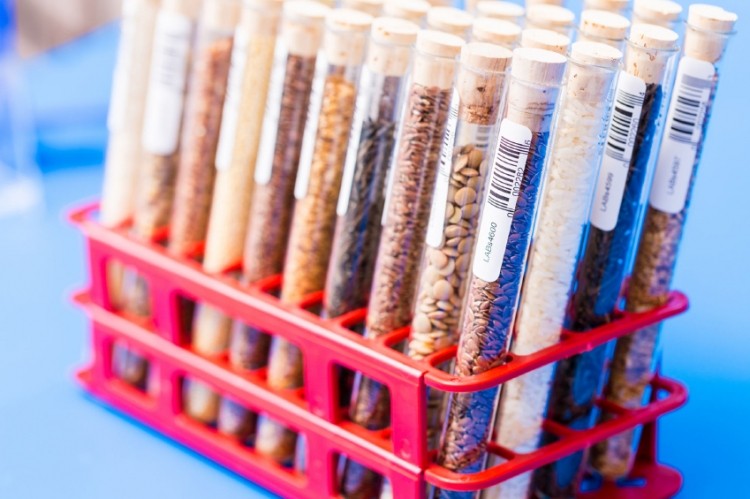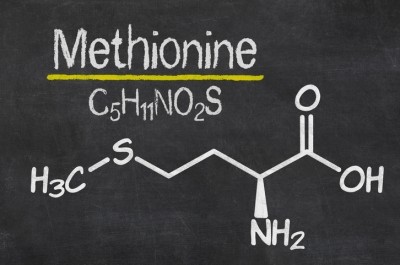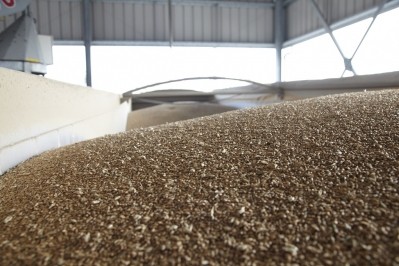Grain economics: GM maize could cut cost of methionine supplementation

Researchers inserted a bacterial gene (E. Coli) into the corn genome to stimulate production of methionine - an essential amino acid that is lacking in corn. This genetically modified maize was found to accumulate 57% more methionine than a high-methionine non-GM variety and to promote significant weight gain in chicks versus non-GM seeds.
“We have shown that by enhancing sulfate assimilation in the leaf by transgenic means coupled with traditional backcross breeding into desirable genetic backgrounds, maize kernels with high methionine content were produced that was of significant increased nutritional value to livestock. Increased methionine […] was bioavailable in the diet fed to chicks and can supplant synthetic methionine supplementation needed for optimal growth,” wrote the researchers in PNAS (Proceedings of the National Academy of Sciences of the US).
Methionine: the absent amino acid
In nature, corn lacks some of the essential amino acids that animals need. Mixing corn with soybean corrects corn’s deficiency of amino acids such as lysine and tryptophan, but not of methionine, which is why the feed industry spends billions of dollars a year on supplementing corn with synthetic methionine.
Usually, maize seeds absorb sulfur from the soil, which limits the pool of methionine and cysteine available for incorporation into zeins - the major seed storage proteins in maize which serve as a reservoir of amino acids for the seedling. This study tested the theory that using a bacterial enzyme to reduce assimilation of sulfur would result in higher methionine expression in seeds. This is because the plants take up the sulfate, reduce it to sulfide and then synthesize methionine.
“The enzyme reduces sulfur taken up from the soil. Reduced sulfur is then used to synthesize methionine during photosynthesis,” explained Dr Joachim Messing, author of the study and professor of molecular biology at Rutgers University, in an interview with this publication.
Key to this process is the APS enzyme, which exists in plant and bacterial form. The plant enzyme has previously been shown to increase methionine, but resulted in stunted plant growth due to the accumulation of toxic metabolites. Dr Messing and colleagues hoped to assuage this issue by using a bacterial enzyme.
The researchers used tissue-specific promoters to express the bacterial enzyme Escherichia Coli. This resulted in a marked increase in methionine in the seed.
Promoting growth in chicks
The GM maize was tested in a four week feeding trial in which three different diet rations consisting of different corn meals were fed to five day old chicks. Weight gain was highest among chicks following a normal diet supplemented with synthetic methionine, closely followed by those fed the GM maize, whereas those fed non-GM kernels and without any methionine supplementation showed the lowest gain.
The researchers claimed these results “represent a breakthrough in the nutritional quality of maize” in an industry where “feed companies want strong performance and yield as well as a high methionine content”.
Dr Messing said the GM maize had the potential to make a “humanitarian contribution” to the health of populations in developing countries as well as improving the economics of feed production in industrialized regions. Whilst the trial focused on chicks, he said the finding were applicable to any livestock, and pointed out that for larger animals such as cattle or pigs, which require more corn to produce the same amount of meat, the economics would be even more compelling.
He said it was “too early” to gauge whether there was any interest from the seed and feed industries but that in the event of enquiries, they would “make it available right away”.
Route to market
In order for it to become a commercially available variety, Dr Messing said that demand would have to come from growers seeking corn with a higher methionine content.
“Seed companies would need to backcross this trait into approximately 150 elite lines because different geographical regions require different corns. This is quite an undertaking in the feed business.”
He said he expected the new variety to be taken up by the US and China ahead of Europe where “there would likely be hesitation because it is a trans gene”.
In the meantime, Dr Messing and the team at Rutgers have made a further discovery: that by crossing this new gene with another maize line, levels of both methionine and lysine can be increased.
“Lysine is another amino acid that is deficient in maize and is currently supplemented in diets based on corn meal,” he explained.
Source: PNAS Proceedings of the National Academy of Sciences 2017.
www.pnas.org/cgi/doi/10.1073/pnas.1714805114
“Engineering sulfur storage in maize seed proteins without apparent yield loss”
Authors: J Planta, X Xiang, T Leustek, and J Messing








